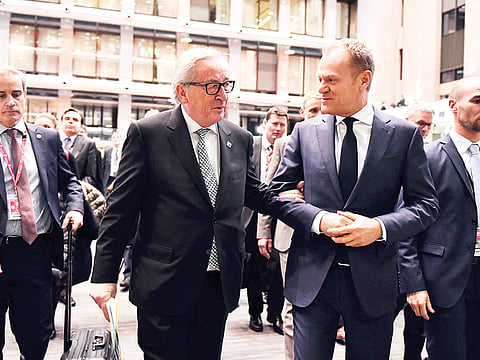EU leaders split over post-Brexit budget
No consensus on whether countries would each pay more into the joint budget to cover a post-Brexit gap of up to €15 billion a year

Brussels: European Union leaders were divided at a Brussels summit on Friday over calls to pay more to fill the huge hole which will be created in their budget when Britain leaves the bloc.
EU President Donald Tusk said the 27 leaders, meeting without Britain, wanted to spend more on defence, migration and security.
But there was no consensus on whether countries would each pay more into the joint budget to cover a post-Brexit gap of up to €15 billion (Dh67 billion) a year.
“Many are ready to contribute more to the post-2020 budget,” Tusk told a news conference.
“It is clear that the priorities are linked with the size of the budget, and in this context we need to address the revenue gap caused by Brexit”.
European Commission chief Jean-Claude Juncker said 14 or 15 countries had agreed to step up their national contributions — which still leaves nearly half of the bloc undecided or opposed.
“This debate was less conflictual than I had expected,” said Juncker, who had earlier warned that countries needed to “pay more” to meet new priorities.
Germany, Spain and France are ready to pay more. But opposition is led by the Netherlands, Denmark, Sweden and Austria, which are all “net contributors” — who pay more into the EU than they get out.
“What we don’t want is the weight of a constant increase in spending,” Austrian Chancellor Sebastian Kurz said.
Merkel migrant plan
The EU’s current seven-year budget of almost one trillion euros runs out in 2020 and leaders need to negotiate a new multi-year spending plan starting in 2021.
Britain has agreed to meet its commitments under the current plan, despite the fact it will be leaving the EU in March 2019.
The European Commission, the EU’s powerful executive arm, has called for spending to increase to between 1.1 per cent and 1.2 per cent of EU countries’ GDP, up from 1.0 per cent in the current budget
Brussels has suggested cuts to agricultural funds, which is sure to anger farmers from major producer France, and payments to poorer regions, which Eastern European states will oppose.
German Chancellor Angela Merkel’s plan to tie regional funding for poorer states to their willingness to take in refugees was less divisive than expected.
“This shouldn’t necessarily be viewed in a negative way, it could be viewed in a positive way” whereby states are rewarded for accepting asylum seekers, Merkel said.
“But this question wasn’t discussed in detail.”
There have also been suggestions that the funding should be made conditional on obeying the rule of law, seen as a shot across the bows to Poland and other Eastern European governments.
But Tusk said he had received “only positive reactions to this opinion. I was positively surprised.” Even Poland’s prime minister did not oppose the plans, added Tusk, a former Polish premier himself.
Tusk said no agreement on the budget was likely before the next European elections in 2019.
‘No appetite’
The European leaders were far more united on another post-Brexit issue: opposing changes to the way the bloc’s top officials are chosen.
They rejected plans to let the European Parliament dictate the choice of a new European Commission chief when Juncker steps down in 2019.
“There was agreement that the European Council cannot guarantee in advance that it will propose one of the lead candidates of the European Parliament,” Tusk said.
Juncker was appointed in 2014 under an agreement whereby the European Parliament nominated “Spitzenkandidat” or lead candidate, and the European Council of leaders would “take into account” their choice.
MEPs argued that it was a more democratic method. But national leaders say it is a stitch-up by Brussels-based political groups that harms national sovereignty.
The leaders also dismissed Juncker’s own proposals that his job should be merged with that of Tusk.
“There was no appetite to take this forward,” said Tusk, also ruling out plans to shrink the European Commission.
British Prime Minister Theresa May is excluded from the meeting in Brussels, the latest in a series of special EU summits aimed at charting a road map following Britain’s shock 2016 vote to quit the bloc.
Tusk on Friday said plans agreed by May’s government for future relations with the EU at a marathon meeting this week appeared to be “pure illusion.”
He will meet her next week in London, and said he would go ahead as planned at a summit in March and issue Brexit negotiating guidelines on the future EU-Britain relationship.
When asked for his thoughts about the British plans, Juncker quipped: “I am not the British prime minister, it would be good for Britain if I was.”



